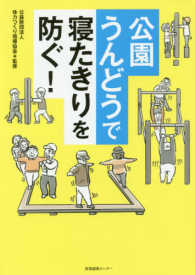- ホーム
- > 洋書
- > 英文書
- > Politics / International Relations
Full Description
Sport has historically been part of a broader quest of regimes for power and prestige on the world stage, and that success in global sport was a function of a country's projection of hegemony and place in an anarchic international system. While such historical trends of politicization of sport continue—witness the nationalism on display at each Olympic games—today sport is equally seen as a strategically key approach for advancing human rights, building peace, strengthening social cohesion, and fostering development. In practical terms, international sport resides between a "realist" world of power and profit while at the same time has become an instrument of liberal internationalism that sees the advancement of individual values of rights, gender equality, and empowerment of often marginalized groups such as indigenous peoples, traumatized war victims, and those with disabilities.
How does international politics affect the world of global sport, and, how -- if at all - can sport contribute to the pursuit of sustainable peace? Sport and International Politics: Power, Profit, and Peace explores the complex linkages between power politics of the international arena, the profit-seeking, often elitist and at-times corrupt world of professional international sport, and the promise for harnessing sport to promote human rights, inclusive development, and sustainable peace in a violent world.
Timothy D. Sisk presents the case that sport's direct relationship to peace is found not in the fanfare of the Olympic Games (without reform), but in sport- and play-related contributions to humanitarian action, expanding the right to access sport and the rights of athletes of all ages and abilities, and in the well-designed employment of sport in youth-based development and peacebuilding programs and projects. Sport's contribution to peace is found not principally in the nation-state ensnared Olympic Games, but instead step-by-step, from the bottom up through sport's contribution to positive youth development, empathy and fairness, and through engendering trust and social cohesion at community and national levels.
Contents
Dedication
Preface
Acknowledgements
List of Abbreviations
List of Figures, Tables, and Illustrations
Introduction
The Achilles' Heels of the Olympic Games: Power and Profit
Can sport contribute to sustainable peace?
Sport for peace: Step-by-step
1. What is sport, and play, globally?
Sport and play: A sociological and psychological approach to sport
Indigenous sport, modern sport
Sport and social dynamics: Toward equality, social cohesion, and peace?
Lending legitimacy: When sport becomes politicized
Conclusion
2. A façade of Peace: Sport, power, and profit in a dangerous world
Nationalism, autocracy, and sports-washing: "War minus the shooting"
Sport diplomacy, boycotts, and banishments
Sport into the 21st century, A globalized façade of peace
Profit: Sport in globalized economies
Conclusion
3. Olympism: A secular religion
Olympism: Myths and myth-making
The historical institutionalism of the Olympic Games
Symbolic politics: Nationalism and sport, then and now
After Beijing 2022: Whither Olympism in a turbulent world
Conclusion
4. The global governance of international sport
The normative foundations of international sport
Advocacy and agenda-setting
Adjudicating sport: Monitoring and accountability
Harm-free, clean sport: A Sisyphean struggle
Conclusion
5. A long association: Sport and human rights
Human rights norms and international sport
Vision vanquished: Abuses of human rights in sport
Toward social justice: Redressing discrimination and marginalization?
"Sport for All:" Realizing access to sport as a human right
Conclusion
6. Pathways from marginalization
Causes of violence: Inequality and injustice, frustration, and extremism
Youth and deadly conflict: Breaking the intergenerational conflict trap
Sport-for-peace: The evolution of practice
A Nexus: Sport, physical and mental well-being, and sustaining peace
Conclusion
7. Pathways to peace: Sport for strengthening social cohesion
Peacebuilding for whom? Challenges of effective practice
Sport in post-conflict contexts
Sport for community-level resilience
Sport, inclusive nationalism, and social cohesion
Conclusion
Step-by-step: Sport, peacebuilding, and the future of peace
Confronting power: Beware of sport evangelism
People before profit: Realizing a rights-based sport regime
Advancing sport's contribution to sustaining peace
Bibliography
Index








